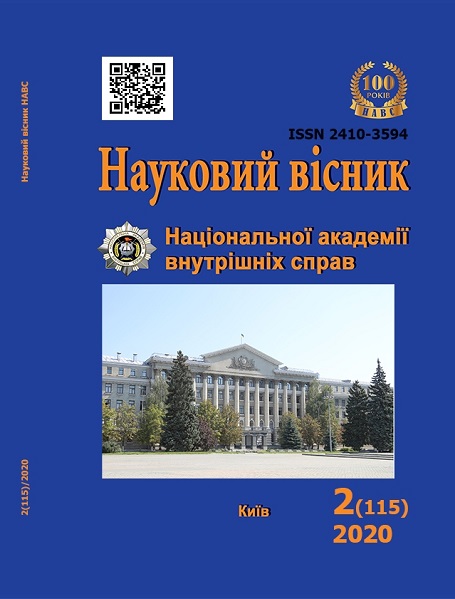Peculiarities of Conducting an Investigative Review during the Investigation of Unauthorized Interference in the Operation of Computers, Automated Systems, Computer Networks or Telecommunication Networks
Abstract
The purpose of the study is to determine the specifics of the investigative review during the pre-trial investigation of unauthorized interference with computers, automated systems, computer networks or telecommunications networks. Methodology. The article uses empirical and theoretical research methods. Among the empirical methods used were employees of operational units of cyberpolice and forensic experts of the Ministry of Internal Affairs, data analysis of the open part of the Unified State Register of Judgments. Theoretical methods were analysis and synthesis, analogy, comparison, generalization. Scientific novelty. Methods of detection, fixation and seizure of intangible digital (electronic) evidence are proposed. The necessity of development of normative acts for systematization of methods of conducting investigative review of evidence sources in digital (electronic) form is substantiated. Conclusions. 1. Investigative review of information in digital (electronic) form is the basis of the system of proving the unauthorized interference in the work of computers, automated systems, computer networks or telecommunications networks. 2. The use of special knowledge during the investigative examination in the pre-trial investigation of computer crimes is mandatory. Involvement of a specialist allows minimizing and eliminating the risks of loss or destruction of digital (electronic) evidence and ensures effective organization of actions of participants in the investigative review. 3. The method of work of the investigator with information in digital (electronic) form is subject to legislative regulation. Consolidation of basic algorithms for organizing the work of the investigative (investigative-operational) group during the investigative review provides proper procedural control over compliance with the law in the pre-trial investigation and determines the systematic improvement of cybercrime investigation methods.
Keywords: investigative review; review of the scene; inspection of computer equipment; computer network overview; review of documents; review of digital (electronic) evidence; computer; computer network; unauthorized interference with computers; computer crime.
Downloads
References
Ахтирська Н. М. Міжнародний досвід використання цифрової інформації у кримінальному судочинстві. Юридичний науковий електронний журнал. 2019. № 4. С. 221–224. doi: https://doi.org/10.32782/2524-0374/2019-4/59.
Амелін О. В., Соколова Я. А. Рекомендації щодо особливостей досудового розслідування та процесуального керівництва у кримінальних провадженнях про злочини, вчинені з використанням електронно-обчислювальних машин (комп’ютерів), систем та комп’ютерних мереж і мереж електрозв’язку : рішення наук.-метод. ради НАПУ (від 20 квіт. 2017 р. протокол № 3). Київ: НАПУ, 2017. 66 с.
Особливості розслідування окремих видів злочинів : мультимед. навч. посіб. / [А. О. Антощук, В. М. Атаманчук, Ю. Б. Комаринська та ін.]. Київ : НАВС, 2016. URL: https://arm.naiau.kiev.ua/books/orovz/lections/lection8.html.
Casey E. Trust in digital evidence. Forensic Science Internationanl: Digital investigation. 2019. No. 31. doi: https://doi.org/10.1016/j.fsidi.2019.200898.
Craiger P. Training and Education in Digital Evidence. Handbook of Digital and Multimedia Forensic Evidence / Edited by: J. J. Barbara. Humana Press Inc., Totowa, 2007. doi: https://doi.org/10.1007/978-1-59745-577-0_2.
Еминов В. Е., Ішенко Е. П. Следственные действия – основа раскрытия преступлений: психолого-криминалистический анализ : практ. пособие. М. : Норма ; Инфра-М, 2015. 208 с.
Використання електронних (цифрових) доказів у кримінальних провадженнях : метод. рек. / [М. В. Гребенюк, В. Д. Гавловський М. В. Гуцалюк та ін.] ; за заг. ред. М. В. Гребенюка. Київ : МНДЦ при РНБО України,
76 с.
Кукарникова Т. Э. Электронный документ в уголовном процессе и криминалистике : автореф. дис. ... канд. юрид. наук : 12.00.09. Воронеж, 2003. 28 с.
Огляд житла чи іншого володіння особи може бути проведено за добровільною згодою особи, яка ним володіє, за умови наявності процесуальних гарантій захисту. Верховний Суд : [офіц. сайт]. 2019. URL: https://supreme.court.gov.ua/supreme/pres-centr/news/615161.
Оприлюднення публічної інформації. Національна поліція : [офіц. сайт]. 2020. URL: https://www.npu.gov.ua/ activity/zviti/oprilyudnennya-publichnoji-informacziji.html.
Parkavi R., Divya K., Sherry R. V. Digital Crime Evidence. Critical Concepts, Standards, and Techniques in Cyber Forensics, IGI Global. Thiagarajar College of Engineering India, 2020. 28 р. doi: https://doi.org/10.4018/978-1-7998-1558-7.ch008.
Поливанюк В. Д. Тактичні особливості проведення огляду місця події при розслідуванні злочинів, вчинених у банківській системі України з використанням сучасних інформаційних технологій. Вісник Запорізького національного університету. 2011. № 1. С. 243–248.
Посібник зі збору доказів для Міжнародного кримінального суду. Київ : М-во з питань тимчасово окупованих територій та внутрішньо переміщених осіб України, 2019. 43 с.
Старушкевич А. Організація огляду місця події. Аналіз криміналістично-значимої інформації при розслідуванні злочинів у сфері комп’ютерної інформації. Вісник прокуратури. 2003. № 12. С. 77–78.
Теплицький Б. Б., Шарай Л. Г., Ковальов К. М., Кузьмін С. А. Злочини у сфері використання електронно-обчислювальних машин (комп’ютерів), систем та комп’ютерних мереж і мереж електрозв’язку: спеціальні питання кваліфікації, проведення слідчих (розшукових) дій, призначення комп’ютерно-технічних судових експертиз : наук.-практ. посіб. Київ : Паливода А. В., 2019. 168 с.
Про рішення Ради національної безпеки і оборони України від 27 січня 2016 року «Про Стратегію кібербезпеки України» : Указ Президента України від 15 берез. 2016 р. № 96/2016. Урядовий кур’єр. 2016. № 52.
Abstract views: 177 PDF Downloads: 698
- Authors reserve the right to authorship of their own work and transfer to the magazine the right of the first publication of this work under the terms of the Creative Commons Attribution License, which allows other persons to freely distribute published work with mandatory reference to authors of the original work and the first publication of an article in this magazine.
- Authors have the right to enter into separate additional agreements on non-exclusive dissemination of the work in the form in which it was published in the journal (for example, to post an article in the institution's repository or to publish as part of a monograph), provided that the link to the first publication of the work in this journal is maintained.
- The journal's policy allows and encourages the posting of articles by authors on the Internet (for example, in electronic storehouses of institutions or on personal websites), both before the submission of this manuscript to the editorial office and during its editorial processing, as this contributes to the creation of a productive scientific discussion and positively affects the efficiency and dynamics of citing the published work.




